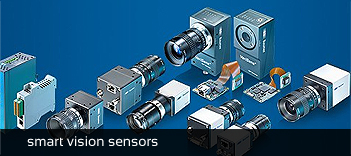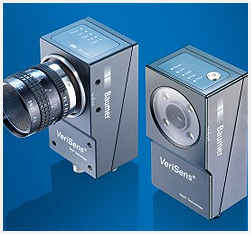Owing to years of experience, we manufacture, supply and trade a quality tested array of Smart Vision Sensors. The Smart Vision Sensors we offer is widely demanded by the clients for their wide usage.
Smart Vision Sensors

Smart Vision Sensors

We provide high quality , high speed Smart Vision Sensors in alliance with Baumer Limited, Switzerland. We are certified system integrators for Baumer Limited in India. These sensors can be deployed for various applications
Area of Application
- Presence check
- Position detection
- Size checking (angle, lengths, thicknesses, heights, inclination)
- Edge detection
- Item detection
- Position detection and checking
- Shape/size recognition
- Reading text/codes (OCR/OCV)
- Completeness checks
- Pick & place
Features:
- IP 67 metal housing for industrial environments
- Built-in LED lighting
- Five digital I/Os (depending on version, also RS485
- FEX® image processor and FEXLoc® part recognition
- Intuitive configuration via PC (Ethernet)
- Ethernet interface (10-Base-T/100-Base-TX)
Frequently Asked Questions (FAQ's)
A Smart Vision Sensor is an advanced imaging device that combines image capture, processing, and analysis capabilities into a single unit. These sensors are specifically designed to perform real-time vision tasks such as object detection, inspection, measurement, and guidance.
A Smart Vision Sensor captures images using an integrated camera, processes them using onboard algorithms, and then provides relevant information or decisions based on the analysis. These sensors often include lighting, optics, and processing capabilities within a compact housing.
Industries such as manufacturing, automotive, electronics, packaging, pharmaceuticals, food and beverage, and logistics benefit from Smart Vision Sensors. These sensors are used for applications like quality control, robotic guidance, and automated inspection.
Key components include an image sensor (camera), a processor for running vision algorithms, optics (lens), integrated lighting, communication interfaces, and software for configuration and analysis.
Smart Vision Sensors can perform tasks such as object detection, presence/absence checking, dimension measurement, barcode and QR code reading, pattern matching, and defect detection.
Smart Vision Sensors integrate all necessary components (camera, processor, lighting) into a single unit, making them compact and easy to deploy. In contrast, traditional vision systems often require separate components and external processing, resulting in more complex setups.
Integrated lighting is crucial for ensuring consistent and high-quality image capture. Proper lighting enhances contrast and highlights features of interest, which is essential for accurate image analysis.
Smart Vision Sensors are typically configured using user-friendly software interfaces. Users can set up inspection parameters, define regions of interest, and program the sensor to perform specific tasks through graphical user interfaces or predefined templates.
Common applications include automated quality inspection, assembly verification, product identification and sorting, robotic guidance, and packaging inspection.
Smart Vision Sensors enhance production efficiency by automating inspection and measurement tasks, reducing human error, increasing processing speed, ensuring consistent quality, and enabling real-time decision-making.
Yes, Smart Vision Sensors can be easily integrated with other automation systems such as PLCs, robotic arms, and industrial networks through standard communication protocols like Ethernet, Modbus, and IO-Link.
Factors to consider include the resolution and speed of the sensor, the type of inspection or measurement task, environmental conditions (lighting, temperature), ease of integration, and the level of support and software features provided by the manufacturer.
Benefits include improved accuracy and reliability of inspections, reduced need for manual intervention, faster processing times, enhanced product quality, and the ability to perform complex inspections that are difficult for human operators.
Smart Vision Sensors are highly reliable when properly installed and maintained. Regular cleaning of the optics, ensuring proper lighting, and updating software as needed are essential for maintaining performance.
Support can include installation assistance, user training, software updates, troubleshooting help, and maintenance services provided by the manufacturer or specialized service providers.
Yes, Smart Vision Sensors can often be upgraded or expanded through software updates that enhance their capabilities. Some sensors also support modular additions such as different lenses or lighting options to suit specific applications.
Smart Vision Sensors are designed to be flexible and can be reprogrammed or reconfigured to handle new inspection requirements. This can be done through their software interfaces, allowing users to adjust parameters or add new inspection criteria as needed.







